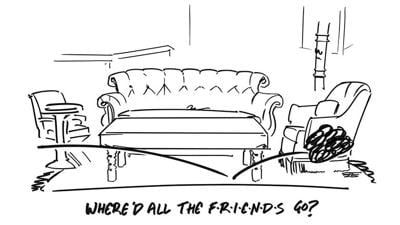I recently came across a meme on Instagram that read, “Instead of scheduling hangouts weeks in advance, let’s just start barging into each other’s apartments uninvited like they do in sitcoms,” with a still image from the show “How I Met Your Mother.”
Although it’s funny to poke fun at the unrealistic nature of beloved television shows, I couldn’t help but wonder if like all comedy, there was some truth hidden beneath the punchline.
People often describe sitcoms like “How I Met Your Mother,” “Friends” and “Seinfeld” as the “comfort shows” they watch whenever they want to feel better. In almost every episode of these shows, characters constantly show up at each other’s apartments and spend time together, showing us the sense of community these fictional characters share that we don’t necessarily see in the real world, at least not anymore.
It’s important to note that most if not all these shows were first aired before the advent of smartphones and social media, which have led to people spending more time scrolling through their feeds and less time interacting with others in person. These sitcoms were also set in large metropolises like New York City where people lived close enough to each other that dropping in at a friend’s place every day was easier.
Living in a suburban or rural area where you can’t get around without a car makes this idea far-fetched for most of us. I have friends who live all over the St. Louis area, and since we’re so spread out from each other, I don’t get to see them as often as I’d like to. In a perfect world, I’d love to just pop over to a friend’s place without the hassle of sitting in traffic on I-270.
Cultural norms have also changed too. When I brought this topic up in the Leader newsroom, my colleagues fondly remembered an analog world where the only way to contact someone was by calling them on a land line or by showing up at their house.
Nowadays, showing up at a friend’s place without letting them know in advance could be the kiss of death for your relationship. In the land of sitcoms, it might seem normal to see Kramer barging into Jerry’s apartment or Phoebe sitting at the breakfast table at Monica’s apartment, but doing the same thing in real life might get you labeled a stalker rather than a close friend. Now, instead of heading to a friend’s place to share a meal together or vent about a problem at work, we send each other TikToks, Instagram reels and texts.
While I could spend this column arguing about the downsides of social media and the frustrations of car-dependent infrastructure, I don’t really think they are the main causes for the lack of personal interactions we see today. I believe the root problem is that we tend to expect less from our friends than we do from other people in our lives.
You can find hundreds upon hundreds of self-help books, seminars and other resources about how to be a better romantic partner, parent or employee. Yet when it comes to platonic relationships, there’s not as much advice out there about how to be a better friend.
Outside the world of sitcoms, is there one true definition of being a good friend? I decided to pose this question to my Instagram story to see what the people around me think.
“Being there for you, through the good, the bad, the OK … they’re with you no matter what,” said one respondent, Andrew Meeks.
He said he came up with that definition of a good friend after separating himself from a group of his high school friends.
“I stopped and thought about how conditional their friendship was, how they only wanted to be around me if they needed something or when I was doing good, but if they didn’t need anything or if I wasn’t feeling great, they wanted nothing to do with me,” he said.
Unlike being a friend, there are specific expectations for those in relationships with a significant other. If you’re in a romantic relationship, you’re supposed to check in frequently, buy nice gifts for each other on special occasions, among other customs. However, when it comes to friends, a lot of those expectations go out the window.
But, who says you can’t talk with your friends all the time and give each other thoughtful presents? Why do we put our metaphorical eggs in one basket and expect to get everything we need from one person rather than from multiple people?
As challenging as the dynamics for romantic relationships and other types of relationships can be, I would argue that friendships are even harder to make and maintain, especially as an adult. Often the baggage of work, families and all the other joys of life stand in the way of spontaneity. Over the years people move, start new jobs, get married, have kids, and along the way you lose touch with each other. While that can be depressing, it is also a part of life. There were people I talked to every day in high school who I probably wouldn’t even recognize if I saw them at the grocery store today.
When I was in college, I had a group of friends I was with all the time. We would watch movies, go disc golfing, throw parties, go on walks and in one instance, visit the emergency room after an allergic reaction to vegan meatballs.
Now that I’ve graduated from college and started work as a journalist, it has become harder to find the time to see these people, and I miss them. We’re still friends, but we’re not as close as we used to be.
It seems there isn’t one right way to navigate friendships as an adult. As corny as it may sound, maybe the “I’ll Be There for You” theme song from “Friends” could serve as more of a guide instead of just some catchy background noise. Maybe the best we can do is show up for each other through everything.




